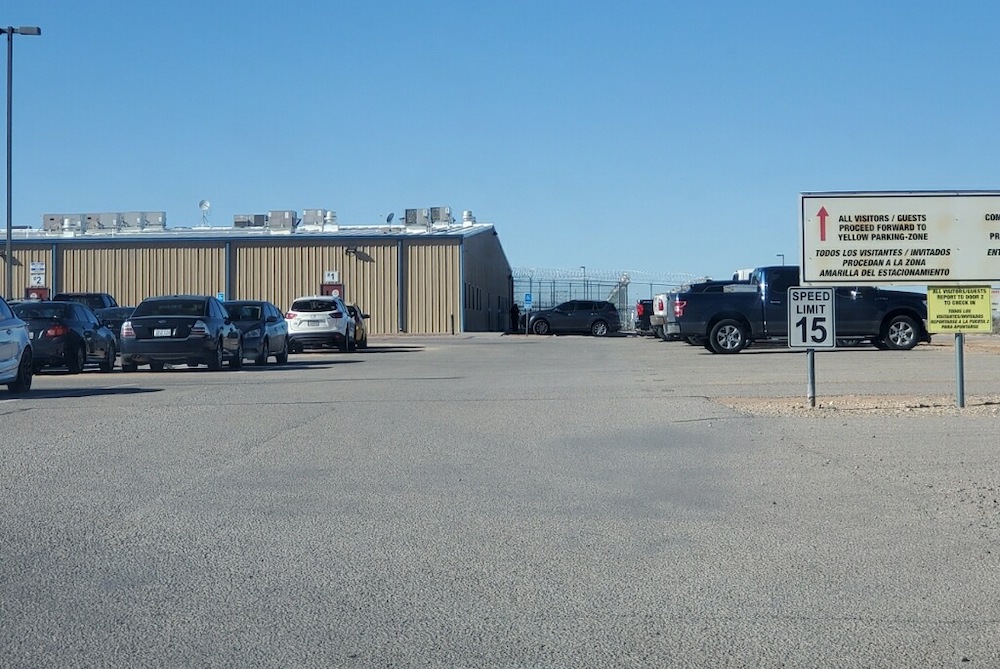
Outside view of Otero County Processing Center in Chaparral, New Mexico (Courtesy of Ana Avendaño)
As El Paso goes into week four of self-isolation and community quarantine, it's hard not to notice the mood change in the community. There are no longer sounds of children playing in the school playgrounds and laughter from weekend family gatherings. The roads are empty and quiet, and no melodies of Spanish-language music float through the neighborhoods. The low hum of wind rustling through the leaves is the new soundtrack to Sun City.
During the second week of April, the number of cases of COVID-19 in El Paso rose to 292. The County of El Paso Department of Public Health announced that the numbers are likely to increase in the coming weeks. Fortunately, El Paso is one of the cities in the country with lower numbers, but that has not stopped the local government from acting quickly and implementing ordinances to ensure the safety of its communities. The "Stay Home, Work Safe" order was implemented March 24, requiring the closure of all nonessential businesses, the prohibition of all public and private gatherings of any number of people, and the restriction of traveling within and out of the city.
With these drastic changes taking place within a short period of time, families experienced hardships like job termination, homeschooling children, and lack of food and access to resources. Unsurprisingly, essential businesses and organizations in El Paso quickly responded to the needs of their community members.
Advertisement
An organization I volunteer with, Ciudad Nueva, an after-school program for elementary, middle and high school students, has fully transitioned to online programming and digital activities for the students. My housemate and fellow Loretto Volunteer Kiara is working endlessly: Her placement, Kelly Center for Hunger Relief, is one of the few food pantries in the city offering hundreds of emergency food boxes each day.
Texas Workforce Commission helps its employees by paying them wages for volunteer work relating to COVID-19 responses. Planty for the People, a local nonprofit that offers free cooking and gardening classes in the community, is selling pay-what-you-can boxes of organic produce. To keep up morale and support for those continuously working and sacrificing their lives, children are writing encouraging messages in chalk on the sidewalk. Local Facebook groups are more active than ever, with new posts offering help and resources to aid those who work on the frontlines.
Kelly Memorial Food Pantry volunteers organize emergency food boxes in El Paso, Texas. (Courtesy of Kelly Center for Hunger Relief)
The heart of El Paso usually looks like families spending their weekends hiking on the mountains, friends having picnics either on the Mexico or U.S. side of the Chamizal National Memorial, and Mexican music blasting from the speakers of restaurants and stores downtown. The spirit of El Pasoans may look a little different now, with less human interaction and more social distancing, but the love and support is the same.
Just as the loving community makes up the heart of El Paso, so do the migrants and asylum seekers being detained behind bars. Another one of my housemates and fellow Loretto Volunteers, Ana, is a paralegal and volunteers at Las Americas Immigrant Advocacy Center. She shared with me how she, her co-workers and her clients are struggling as they work amid the pandemic.
Attorneys are prohibited contact and visitation with their clients at Otero County Processing Center to take the safest and most responsible precautions to avoid infecting the detainees. Ana is having trouble simply speaking to her clients because of the recent changes. U.S. Immigration and Customs Enforcement officers and deportation officers have not been helpful in connecting clients with their attorneys over the phone. Usually, the legal team is able to receive documents in person, but now, the clients have to mail them and pay for postage themselves. Detention facilities are not providing soap or cleaning products, only a small bottle of shampoo and a communal bucket of water and vinegar to clean barracks. It's no surprise that there is already one confirmed case in Otero, given the circumstances and lack of assistance and intervention from ICE.
Sidewalk chalk art done by children from a youth shelter in El Paso, Texas (Celine Reinoso)
The whole world is having to adjust to this new normal, and it's both terrifying and remarkable to witness such a defining point in history. I am staying updated and informed of how other cities, states and countries are reacting to this time through social media, friends and family living in various places.
Most of my family is in the Philippines, so I am acutely aware of how serious it is in Asia, but more specifically in one of the most populated islands of the continent. Similar to what is happening in the United States and here in El Paso, community members are having to step up and take action to protect each other because of the lack of assistance from political leaders. This resistance and reciprocity between community members in the border city I currently live in, the Southeast Asian country I call home and, I'm sure, many other communities around the world prove this is just a temporary obstacle, and our universal and unchanging human nature of caring for one another amid crisis and change is how we will make it to the end.
[Celine Reinoso is a Loretto Volunteer in El Paso, Texas, working at Villa Maria, a transitional homeless shelter for women.]







